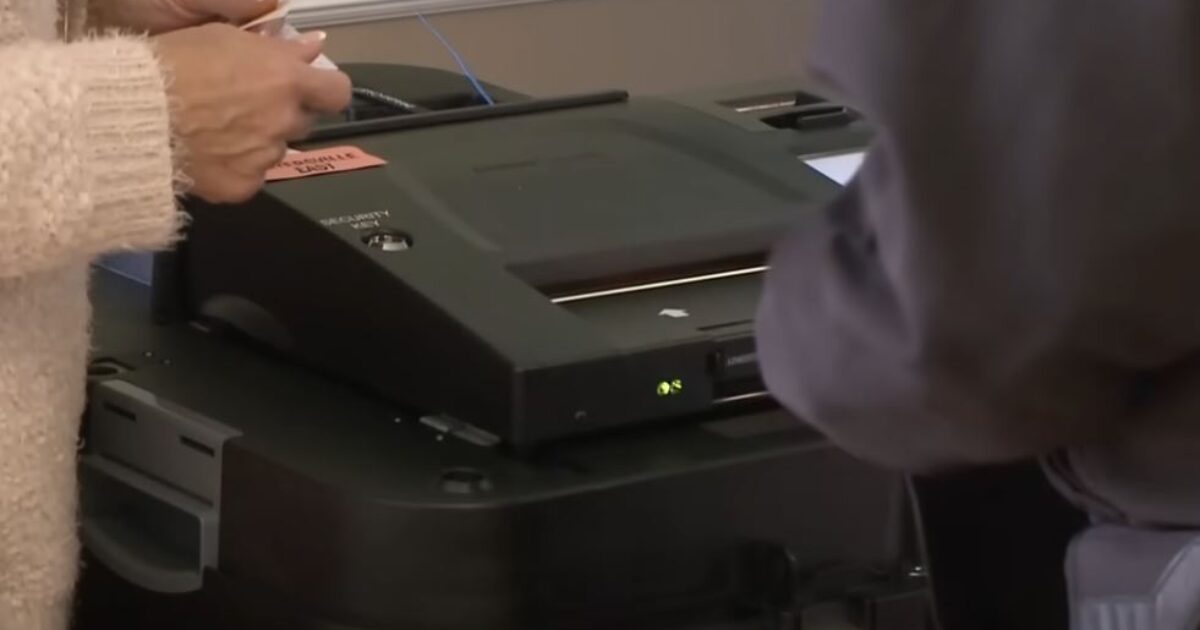A recent poll conducted earlier this month found that 64%, nearly two-thirds, of likely voters are “concerned…that electronic voting systems may allow votes to be changed remotely through internet connections during voting,” according to Rasmussen Reports.
The same poll found that 41% of likely voters prefer to vote on a paper ballot, whereas just 28% prefer an electronic voting machine and 29% believe “it does not make much difference.” Men were more likely (46%) than women (26%) to prefer paper ballots, but neither group favored electronic voting machines over paper.
President Donald Trump has raised public concern regarding “inaccurate” electronic voting machines last month following a March 2025 executive order that called for all electronic voting machines to meet certification standards consistent with the Election Assistance Commission’s (EAC) Voluntary Voting Systems Guidelines 2.0 (VVSG 2.0).
At this time, only one voting system has been certified under the most recent VVSG 2.0. VVSG 1.0, the previous standard, was adopted in 2005 and predates the iPhone.
According to the Rasmussen Reports poll, this is not as partisan an issue as it was portrayed following the 2020 Election and Mockingbird Media reporting. Rasmussen found that 77% of Republicans, 56% of Democrats, and 61% of unaffiliated voters “are at least somewhat concerned that electronic voting systems may allow votes to be changed remotely through internet connections during voting.”
As voters seem more and more concerned about the security of electronic voting machines, it is worth re-examining circumstantial evidence from the 2020 Presidential Election and beyond.
On March 25th, 2025, President Trump signed the “Preserving and Protecting the Integrity of American Elections” executive order, which gave the EAC 180 days to “review and, if appropriate, re-certify voting systems under the new standards…and to rescind all previous certification of voting equipment based on prior standards.” The 180-day period expires later this month.
The Gateway Pundit has reported extensively on issues with the electronic voting machines. In January 2024, The Gateway Pundit reported on devastating hacks of the Dominion ICX systems performed by Dr. J. Alex Halderman in federal court during Curling v. Raffensperger. Dr. Halderman showed how inexpensive, widely available products from Amazon and other retailers could be used to manipulate votes without the voter’s knowledge, even if they checked to confirm the ballot marking device’s accuracy on the physical paper ballot.
Part 3: Full Scope of Dominion ICX Hack in Federal Court is FAR Worse than Just the BIC Pen Hack
The Gateway Pundit also first reported the story about “erroneous code” that was discovered and reported by the Elections Assistance Commission in 2022 in Williamson County, Tennessee. The “QR Code Signature Mismatch,” as it was written in system log files.
The EAC reported:
“On November 3, 2021, the EAC received a report from the Tennessee Secretary of State’s (TN SoS) office that they were planning an investigation into an anomaly observed in Williamson County, Tennessee during a municipal election held on October 26, 2021, regarding Dominion D-Suite 5.5-B ImageCast Precinct (ICP) tabulators. Close poll reports from 7 of the 18 ICP tabulators used during the election did not match the number of ballots scanned. Subsequent tabulation on the jurisdiction’s ICC central count scanner provided the correct tally. The central count tabulation was confirmed via hand count of the paper ballot records on October 27, 2021.”
“When these events were logged, the ballot was rejected. Subsequent resetting of the ICP scanners and additional tabulation demonstrated that each instance of the anomaly coincided with the previous mentioned audit log entries, though not every instance of those audit log entries resulted in the anomaly,” the EAC report reads.
“Further analysis of the anomaly behavior showed that the scanners correctly tabulated all ballots until the anomaly was triggered. Following the anomaly, ballots successfully scanned and tabulated by the ICP were not reflected in the close poll reports on the affected ICP scanners.”
This report was focused on the Democracy Suite 5.5B software used in Williamson County, however, the same anomaly appeared in system logs reviewed by several investigators in Georgia, including logs reviewed by the Gateway Pundit for several counties. Of the 66 counties whose system logs were reviewed in Georgia, 64 of them (97%), had the “QR Code Signature Mismatch” error in the logs.
Coincidentally, during a speech on January 6th at the Washington Monument, attorney John Eastman and Rudy Giuliani pointed out a very similar discrepancy they observed based on the January 5th run-off in Georgia. The thread below reviews the “QR Code Signature Mismatch”:
1/ Georgia Election Thread:
John Eastman said this on Jan 6.
I’ll explain why that could be so significant to what happened in Georgia, and maybe elsewhere.
This is not just important for election integrity, but also for the indictment of @hw_floyd and @realDonaldTrump pic.twitter.com/BA0EuJ0NNN
— CannCon (@CannConActual) November 13, 2023
The Gateway Pundit reported that over the weekend, Congresswoman Marjorie Taylor Greene called for a formal investigation into the 2020 Presidential Election in Fulton County, Georgia, citing “unreconciled election data, improper procedures, and the failures of the Georgia election system overall” as justification.
In March, around the same time as President Trump’s EO on elections, Rep. Pete Sessions announced that he would be introducing the Make Elections Secure Act (MESA), as first reported by The Gateway Pundit. The bill would eliminate electronic voting machines and ensure hand-marked, hand-counted paper ballots while significantly limiting mail-in balloting.
The post Rasmussen Reports: Nearly Two-Thirds of Voters Suspect Electronic Voting Machines “Vulnerable to Online Manipulations” appeared first on The Gateway Pundit.











